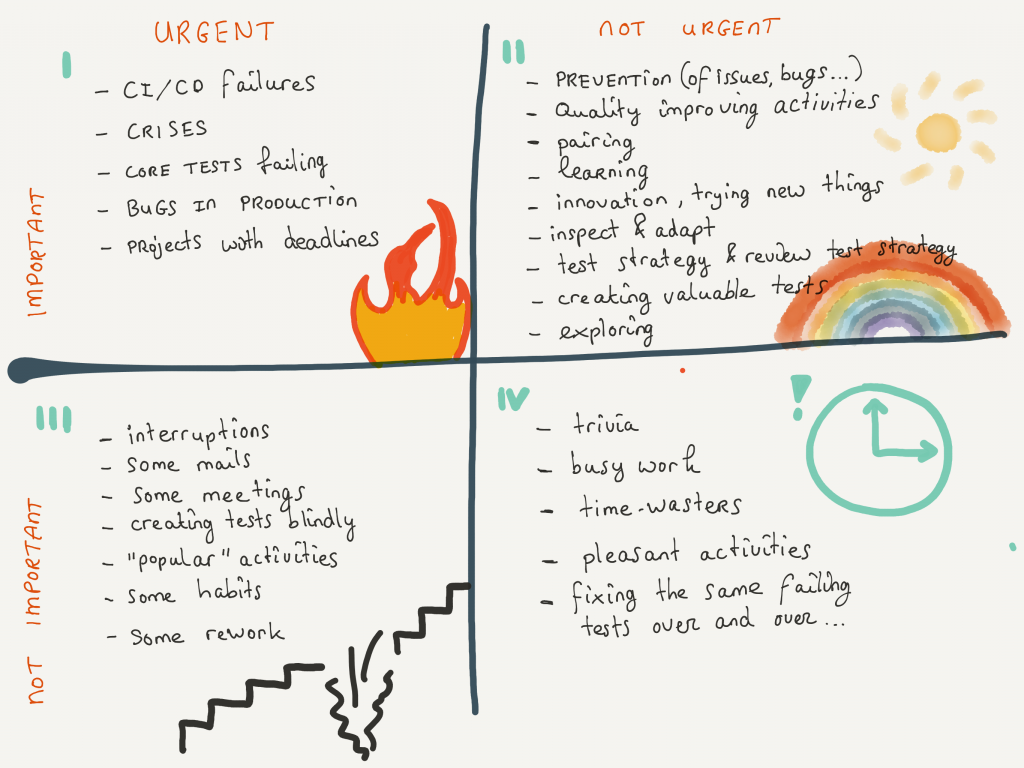Learning on the Job
I carve out time every day to learn new things while I’m at work. For me, learning can happen in many different ways: I might pair up with someone to work together, I might read a bit in a book about API testing, I might follow a tutorial on a specific tool, I might read a blog post about a specific topic, and so on. Right now, I’m focussing a lot on pairing because I feel that benefits both me and the other person a lot.
While I was pairing with someone to work with a specific tool, they asked me if I “had time to spare to teach myself how to work with this tool” and I was like: “no, I think that’s just part of the job and I make time for it”. My colleague said that they don’t have enough time to learn new things because they get caught up in the day to day business (fixing and creating automated tests, testing user stories, etc). They even feel guilty if they would abandon some of the daily tasks to set aside time for learning. Speaking to another (junior) colleague revealed the same story: they didn’t want to learn certain skills ‘on the job’ because they thought those skills didn’t fit the testing role.
Yet another quadrant
This made me think of the book The 7 Habits of Highly Effective People and the important versus urgent quadrant (why is it always a quadrant!!??) that is described in it. I wonder how many people are stuck chasing the urgent stuff and put aside the non-urgent but important tasks (such as learning new skills or acquiring more knowledge about their field).
I drew a version of the quadrant with some testing related activities in it. It’s by no means complete, but it can give you a general idea of where you spend most of your time. Quadrant II is where the sunshine and rainbows are at! In Quadrant I, stuff’s on fire. In Quadrant III you feel like you are doing cool stuff, but in reality, you aren’t. Finally, we have Quadrant IV where nothing of importance or urgency is happening. Activities in Quadrant IV could be time-boxed as a way to keep them in check.
As a personal example from my current context: I notice that we waste a lot of time fixing recurring failing automated tests without thinking of different options (solutions), which seems like a quadrant IV activity to me. I noticed that one of the tests was making an assert if a very brittle way (checking if a certain text was there, while that text is not under our control), but when I mentioned this in the pull request I was met with a lot of excuses: “it should be a unit test, but we’re not going to change it now”, was basically the gist of it. When are we going to change it though? That’s a Quadrant II activity; ain’t nobody got time for that!? Not a whole lot of time is carved out for improving the current situation unless it somehow moves to the first quadrant and suddenly the urgency is felt.
Working on quadrant II activities is a conscious choice. But before you notice that, you have to be aware of how you spend your time. Are you spending time in the first quadrant a lot? (Some people just love crises and they end up being incident managers, hehe). Or maybe the third? (You enjoy meetings with no practical outcome, are you a manager in the making?) Or the very much comfort-zone fourth quadrant? (new skills, who needs new skills?)
Tasks in quadrant II require focus and often require a vision of what the desired end result should look like. I hope you don’t just blindly start learning a new skill without thinking of a good reason why you need that skill. For example, right now I’m spending a good chunk of my time learning more about API testing in general and trying to improve my skills with the tool POSTMAN. That is because we are moving towards microservices and the whole backend is being refactored. It needs to be tested well and I want to contribute to that. I feel motivated to do so, but I need to improve my skills. Because I have a good ‘why’ for my learning, it feels incredibly rewarding to improve. Sharing the things I’ve learned with the other testers makes it even better.
On permission & necessity
I’m not the first one to say it, but if you feel you are in a position where you have to get permission to learn something new….you might want to ask yourself if that is even true or something you tell yourself to keep you inside your comfort zone. Find out the ‘why’ of this thought/feeling.
Learning new things is very healthy for your brain, to feel purpose and I think it’s just plain necessary. Our jobs are centered around our cognitive abilities and our cognition is never static. It should be nurtured and developed. Furthermore, the IT-world is ever changing and if you don’t change with it you are only hurting yourself. This might sound threatening, but it’s also thrilling. There are so many options and choices to make in what you want to learn, it’s great!
Do you learn on the job?




Comments ()